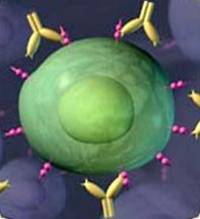 "We have discovered the secret of life!" Francis Crick, 1953 In 1953 Cambridge scientists Watson & Crick discovered the double-helix structure of DNA. 50 years later other Cambridge scientists such as John Sulston were key in decoding the human-genome - another fundamental breakthrough had occurred that might allow us to one day to personalise medicine.
"We have discovered the secret of life!" Francis Crick, 1953 In 1953 Cambridge scientists Watson & Crick discovered the double-helix structure of DNA. 50 years later other Cambridge scientists such as John Sulston were key in decoding the human-genome - another fundamental breakthrough had occurred that might allow us to one day to personalise medicine.
 |
Figure 1: Watson & Crick with their double-helix model of DNA |
Imagine it - you visit your GP and the first thing he does is to painlessly collect a sample of your DNA from your cheek or fingerprint. A press of the key on his computer brings up your individual genome and a couple of minutes later your DNA has been analysed and your doctor can prescribe you the drugs that will suit your individual genetic make-up. The analysis might predict your response to a particular medicine, recommend the dose you need and indicate what side-effects you might have. The need for educated guess work - gone! Although such a scenario sounds fantastical, pharmacogenetics, pharmacogenomics and advances in new technologies mean that it could become a reality. A reality that could dramatically change the delivery of health care by altering the way diseases are defined, patients are treated, and new medicines are discovered and developed.
 |
Figure 2: Doctors prescribe treatments based on the patient's symptoms and use their skills to prescribe a regime which is hopefully safe and efficacious |
Scientists have known since the 1950's that individuals can react differently to any single drug, and much of this is due to individual genetic variation. Personalised Medicine is thus most often associated with pharmacogenetics which is the study of how individual genetic variation affects our response to medicines. Most medicines today are essentially based on a 'one size fits all principle'.
Doctors prescribe treatments based on the patient's symptoms and use their skills to prescribe a regime which is hopefully safe and efficacious. However, there are problems with this approach. Doctors may often try several medicines on a patient before they find one which works (efficacy). This is because one disease may actually have a number of underlying causes based on different genetic characteristics. Common drugs used to treat this 'single' disease may only work well in a subset of patients - indeed many current treatments only work in 30-60% of patients. Patients also vary in their ability to metabolise drugs (safety); this is due to individual differences in key liver enzymes (such as CYP2D6) which are responsible for processing ingested drugs.
 |
Figure 3: AmpliChip CYP450 - the world's first pharmacogenomic microarray designed for clinical applications |
"The vast majority of drugs - more than 90 per cent - only work in 30 or 50 per cent of the people" Allen Roses, worldwide VP Genetics, GlaxoSmithKline, 2003.
Pharmacogenetics and associated techniques have the potential to address these patient-centred problems, and also alleviate some commercial drug development issues. As an example, in 2004 Roche introduced a microarray based diagnostic chip (Amplichip CYP450) that can determine which liver enzyme variants an individual possesses. This information gives a physician a more precise idea of how a patient will tolerate a particular drug and thereby avoid dangerous side-effects. This represents Personalised Medicine in action - a drug chosen on the basis of a patient's individual genetics.
The most famous example of Personalised Medicine is Genentech's Herceptin. This novel anti-cancer drug failed its initial clinical trials as it worked in only a fraction of patients. Normally such drugs are abandoned on efficacy and cost-effectiveness grounds. However Genentech performed further work and discovered that the drug worked extremely well in a subset of patients whose cancers over-expressed the protein HER-2. The drug is now considered a vital treatment for these women (who are identified on the basis of a pharmacogenetic test). The lead researcher in this study Professor Yu, University of Texas commented :
"In the past, selecting a particular chemotherapy drug has been a lottery. Patients had no way of knowing if they would benefit. The new generation of cancer drugs is providing targeted treatment with fewer side effects and giving patients a better chance that a particular treatment will work for them".
 |
Figure 4: Monoclonal antibodies targeting a HER2 protein over expressing cell |
Pharmacogenetics may also open up new avenues of research by allowing medicines to be designed based on an understanding of disease at a genetic level. At Cambridge, many leading researchers are working to decipher the molecular & genetic basis of complex diseases. Professor Carlos Caldas, Department of Oncology, is looking to generate molecular classifications that correlate with distinct clinical outcomes using expression profiling and other techniques. The predictive value of these indicators is then tested on tissue samples from large patient cohorts. The eventual aim is to be able to genetically assess an individual patient and use molecular classifications to inform therapy choices. Meanwhile, Dr Sabine Bahn at the Institute for Biotechnology is investigating the genetic basis of neuropsychiatric diseases such as Schizophrenia and Bi-polar disorder. Drug treatment for mental illness is currently hit and miss, and patients often discontinue treatments due to severe side-effects. Dr Bahn's particular focus is therefore on identifying biomarkers and genetic traits which will lead to the development of pharmacogenetic tests to guide drug use, as well as offering new targets for drug development. Also at the Institute for Biotechnology, researchers in Professor Chris Lowe's lab are developing the diagnostic technology which is so important for this field. One problem with current tests is their complexity which prevents them being used in a doctor's surgery for example. New technology based on holograms allows a test result to be obtained quickly for a particular analyte, with the result being shown as a visible hologram. This technology is now being commercialised by the spin-out Smart Holograms Ltd.
 |
Figure 5: Sensor holograms have many applications in the Life Sciences industry, in particular in Diagnostics and Medical Devices |
In addition to improving drug safety, efficacy, and highlighting new drug targets, the science of pharmacogenetics may benefit the pharmaceutical and biotech industries in other ways. The current pharma business model is based around producing blockbuster drugs generating massive revenues of >$1billion per year. This model exists because of the low success rate and high costs of taking compounds from discovery through to market: only 9% of pre-clinical compounds ever get to market and the cumulative cost (including failures) of getting one drug to market is estimated to be in the region of $1.8 billion dollars. This model is now under pressure because of increased regulatory hurdles, and the fact that much 'low-hanging fruit' has been picked. Pharmacogenetics could address some of these problems. For example, clinical trials could be shorter and cheaper if patients likely to suffer adverse reactions were identified and excluded from trials. Because of the blockbuster model, big pharma has been reluctant to embrace pharmacogenetics to date. In contrast, Biotech companies have been quick to exploit the new technology, and are happy with smaller revenues of, for example, $300 million for a drug which works on a small number of people.
 |
Figure 6: Gene-based approaches introduce a new language of "probability" and "susceptibility" to medical care. |
It is worth remembering that, in the face of all this remarkable science, personalised medicine has major ethical, legal and social implications too. Particularly in areas such as patient consent and genetic testing. For example: who owns genetic information?; will small groups of patients with certain genetic profiles be left without treatments because drug companies are not willing to develop drugs for them?; should testing be performed when no treatment is available?; should pharmacogenetic tests be available over-the-counter or only in doctor's surgeries?
The Cambridge Genetics Knowledge Park (CGKP) and the Dept of History and Philosophy of Science, Cambridge focuses on issues such as these and you can read a previous article on ethics and pharmacogenomics by clicking the appropriate link to 'other articles by the author' below.
For general information, contact: Cambridge Computational Biology Institute, Centre for Mathematical Sciences, Wilberforce Road, Cambridge CB3 0WA










Comments
Add a comment